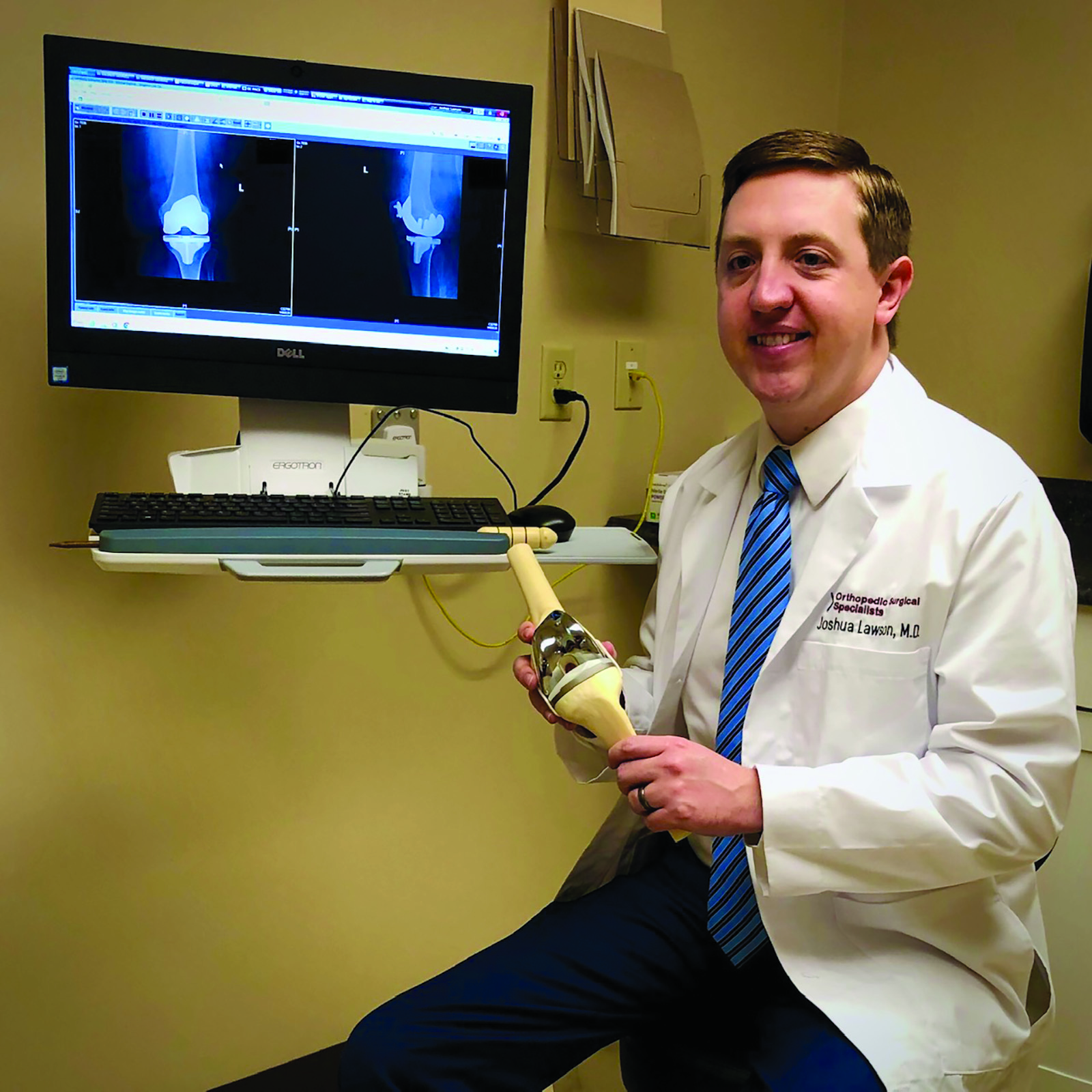If you're noticing chronic knee pain more often than not, then arthritis could be to blame. Dr. Joshua Lawson, a local orthopedic surgeon, is working to educate people on both causes and options for treatment, which are both widely varied.
"There are many forms of knee arthritis, but the most common is osteoarthritis, which occurs from wear and tear to the cartilage over time," Dr. Lawson explained, noting that inflammatory arthritis, such as rheumatoid arthritis, is another common form of knee arthritis. "Risks factors for the development of osteoarthritis include obesity, history of injuries or trauma to the knee, bone deformities, repetitive stress or high impact activities, genetics, and age, with as many as 1 out of 10 adults age 60 or older being affected."
Dr. Lawson also pointed out that the most common symptoms of knee osteoarthritis are throbbing, aching pain, pain that worsens with weight bearing activities, knee swelling, joint stiffness, and sensations of popping and crunching with knee motion.
Once you've targeted the cause and the type, there are a number of treatment options available for all forms of knee arthritis.
"Treatment begins with non-operative options," Dr. Lawson said. "First line options generally include symptom management with anti-inflammatory medications called NSAIDs, activity and exercise changes, ice therapy, physical therapy, and intra-articular steroid or viscosupplementation injections."
He went on to share that if these options do not adequately control the symptoms, surgery, most commonly in the form of a joint replacement, may be recommended, and just like the non-operative options, there are many choices to consider.
"The first decision to be made is whether the entire knee needs to be replaced or just part of the knee," he said. "A total knee replacement is when all surfaces of the knee are replaced, and a partial knee replacement is when only part of the knee is replaced."
The selection of a total or partial knee replacement is based on the location of the arthritis in the knee and its severity, as well as patient factors such as age, weight, and physical demands, Dr. Lawson noted.
"I typically recommend a patient consider a knee replacement when conservative measures are not adequately controlling a patient's symptoms, and the symptoms are interfering with his or her ability to work, interact with family, or participate in their favorite hobbies."
Recovery from a knee replacement is dramatically faster than it historically has been, as well.
"Patients typically stay in the hospital overnight and go home the next day, however, very motivated patients can sometimes even go home the same day," Dr. Lawson said. "Whether a patient stays overnight or goes home the same day, they start getting out of bed and working with physical therapy the day of surgery."
Physical therapy is an important part of the recovery to maximize strength and function after a knee replacement and typically lasts about six weeks. Pain control after knee replacement surgery has also improved dramatically and we are no longer solely reliant on narcotic pain medications, according to Dr. Lawson.
"During the past few years, there have been many exciting new changes to knee replacement technology as well that has demonstrated positive improvements in recovery, satisfaction, and longevity of knee replacement surgery," he shared. "There has been a dramatic increase in the use of technology to improve surgical precision and accuracy, through the use of navigation and robotics. By improving implant position and soft tissue balancing, patients recover faster and have a more satisfying result."
To learn more about Dr. Lawson and his practice or to schedule a consultation, call his office at 423-803-4975 or visit orthopedicsurgicalspecialists.com or find them on Facebook at www.facebook.com/OrthoSurgSpecialists.
Noteworthy:
"Risks factors for the development of osteoarthritis include obesity, history of injuries or trauma to the knee, bone deformities, repetitive stress or high impact activities, genetics, and age, with as many as 1 out of 10 adults age 60 or older being affected." Dr. Joshua Lawson
For more information:
To learn more about Dr. Lawson and his practice or to schedule a consultation, call his office at 423-803-4975 or visit orthopedicsurgicalspecialists.com or find them on Facebook at www.facebook.com/OrthoSurgSpecialists.

